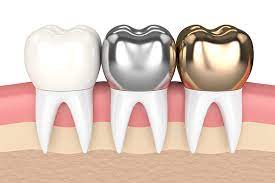Crowns
Dental crowns, also known as dental caps, are prosthetic devices used to cover and restore damaged, decayed, or aesthetically compromised teeth. They are designed to encase the entire visible portion of the tooth above the gumline, providing strength, protection, and improved appearance. Here’s some information about dental crowns:

1. Purpose: Dental crowns are used for various reasons, including:
– Strengthening a tooth that has undergone significant decay or damage.
– Protecting a tooth after root canal treatment.
– Restoring a fractured or chipped tooth.
– Covering a tooth with a large filling, when not enough natural tooth structure remains.
– Enhancing the appearance of a misshapen, discolored, or poorly aligned tooth.
2. Materials: Dental crowns can be made from different materials, including:
– Porcelain: These crowns provide a natural-looking appearance and are often used for front teeth.
– Porcelain-fused-to-metal (PFM): These crowns have a metal substructure for strength, covered with porcelain for improved aesthetics.
– Metal: Crowns made of gold alloy or other metals offer durability and strength, often used for back teeth.
– Zirconia: This is a strong, tooth-colored material that provides excellent aesthetics and durability.
3. Procedure: The process of getting a dental crown typically involves multiple steps:
– Examination and Preparation: The dentist will evaluate the tooth’s condition, take X-rays, and determine if a crown is necessary. The tooth is prepared by removing any decayed or damaged areas, and shaping it to accommodate the crown.
– Impressions: An impression of the prepared tooth is taken to create a custom-made crown that fits accurately.
– Temporary Crown: While the permanent crown is being fabricated in a dental laboratory, a temporary crown is placed to protect the prepared tooth.
– Crown Placement: During the final appointment, the temporary crown is removed, and the permanent crown is carefully checked for fit, color, and aesthetics. Once approved, it is permanently cemented onto the prepared tooth.
4. Care and Maintenance: Proper oral hygiene is essential to maintain the longevity of dental crowns. It includes regular brushing, flossing, and routine dental check-ups. Avoiding habits such as chewing on hard objects or grinding teeth can help prevent damage to the crown.
5. Lifespan: The lifespan of a dental crown varies depending on several factors, including the material used and oral hygiene practices. On average, dental crowns can last between 10 to 15 years or longer with proper care.
If you’re considering a dental crown, it’s important to consult with a qualified dentist. They will evaluate your oral health, discuss the treatment options, and help you choose the most suitable type of crown for your needs.
Book An Appointment
Looking for a Certified Dentist?
We’re always accepting new patients! We believe in providing the best possible care to all our existing patients and welcome new patients to sample the service we have to offer.
Near By
Our Branches
- Nallagandla
- 7660000226
- Nanakramguda
- 7660000225
- Madhapur
- 7660000223
- Kukatpally
- 7660000224
